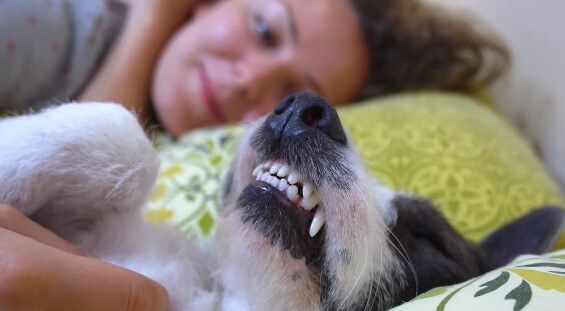Have you ever wondered, Why does my dog want to sleep with me every night? You are not alone, however! Many pet owners discover that their furry friends often sleep on the same bed as them.
We’ll cover this topic, we will know the dog’s common reasons why they prefer to sleep with you. We’ll go over the motivations for your pet’s decision to sleep in your bed rather than their own, ranging from a need for comfort and security to a desire for company.
Prepare to explore the endearing world of dog cuddles and learn the reasons why your dog chooses to sleep next to you every night. Let’s look at the advantages of this lovely behavior!
Understanding the Desire for Sleep Companionship
The desire for sleep companionship is a common behavior exhibited by many dogs. Owners often wonder, Why does my dog want to sleep with me every night?
This behavior can be traced back to the evolutionary instinct of dogs to seek comfort and security in a pack setting. Dogs are social animals that naturally crave companionship, and sleeping close to their owners provides them with a sense of safety and belonging.
One reason why dogs may want to sleep with their owners is the emotional connection they have developed over time. Dogs form strong bonds with their human counterparts, viewing them as members of their pack.
Sleeping together allows both parties to feel connected and reinforces the bond between them. It also provides reassurance for the dog, knowing that its owner is nearby.
Additionally, factors such as warmth and familiarity play a role in a dog’s preference for sleeping with its owner. Dogs are sensitive to temperature changes and often seek out warm places for restful sleep.
The body heat generated by sleeping next to humans provides an extra level of comfort for them. Furthermore, familiar scents and sounds associated with their owner’s presence create a soothing environment that promotes better quality sleep.
Understanding why dogs desire sleep companionship helps owners appreciate the significance this behavior holds for their furry friends.
Recognizing these instincts can guide us in providing our pets with optimal care, ensuring they feel secure, loved, and well-rested each night without compromising our own sleep patterns or routines.
The Evolutionary Instinct of Dogs to Seek Comfort
Dogs have been our loyal companions for thousands of years, and their instinct to seek comfort from humans can be traced back to their evolutionary history.
This desire for sleep companionship is deeply ingrained in their DNA, as they have evolved alongside humans and developed a strong bond with us. So, why does your dog want to sleep with you?
One reason is that dogs are social animals by nature. They thrive on the company of others, especially their human family members.
Dogs view us as part of their pack and feel secure when they are close to us during sleep. Just like how we find comfort in the presence of loved ones, dogs also seek solace and reassurance by sleeping near their owners.
Furthermore, dogs have a heightened sense of smell that allows them to pick up on our unique scent. The familiar scent provides them with a sense of security and belonging when they curl up next to us at night. It’s almost like having a comforting reminder of home right beside them.
As you can see, the evolutionary instinct for dogs to seek comfort from humans during sleep stems from their social nature and the deep emotional connection they form with us over time.
Understanding this innate need can help foster stronger bonds between you and your furry friend while promoting healthy sleeping patterns for both parties involved.
Dogs have evolved alongside humans and developed a strong bond with us, leading to their instinct to seek comfort from humans.
• Dogs are social animals by nature and view their human family members as part of their pack. They feel secure when they are close to us during sleep.
• Dogs have a heightened sense of smell that allows them to pick up on our unique scent, providing them with a sense of security and belonging when they sleep next to us.
• Understanding the evolutionary instinct for dogs to seek comfort from humans can help foster stronger bonds between owners and their furry friends.
• Sleeping near their owners can promote healthy sleeping patterns for both dogs and humans.
The Emotional Connection Between Dogs And Their Owners

Dogs have long been known as man’s best friend, and the emotional connection between dogs and their owners is undeniable.
Many dog owners wonder why their furry companions choose to sleep with them instead of in their own beds. This strong desire for closeness during sleep can be attributed to the deep bond that forms between dogs and their human counterparts.
The emotional connection between dogs and their owners plays a significant role in why dogs prefer to sleep with us. Dogs are social animals by nature, having descended from wolves who live in packs.
They seek comfort, security, and companionship from those they trust, which often includes sleeping together. When a dog sleeps next to its owner, it not only feels physically protected but also emotionally connected.
Furthermore, sleeping with their owners satisfies a dog’s instinctual need for warmth and safety.
Dogs naturally gravitate towards warm spots when resting or sleeping as it mimics the feeling of being nestled close among littermates or pack members for added protection against predators.
By choosing to sleep with us humans, our canine friends find both physical warmth and emotional security all in one place.
Understanding this emotional connection helps explain why so many pet parents ask themselves, why does my dog sleep with me? It is not just about sharing a bed; it represents an unspoken language of love and loyalty that exists between humans and our four-legged companions.
As we delve deeper into the factors influencing a dog’s sleeping preferences, we uncover more fascinating insights into the intricate relationship shared by dogs and their devoted owners.
Factors Influencing a Dog’s Sleeping Preferences
Understanding the factors that influence a dog’s sleeping preferences can provide insight into their behavior and help pet owners create a comfortable sleeping environment for their canine companions. One significant factor is the emotional connection between dogs and their owners.
Dogs are social animals that thrive on human interaction, and many seek comfort by sleeping in close proximity to their owners. This desire for sleep companionship may stem from an instinctual need for security and protection.
Breed characteristics also play a role in a dog’s sleeping preferences. For example, Shih Tzus are known for being affectionate lap dogs, which may explain why they often prefer to sleep with their owners.
These small breeds crave warmth and closeness, making them more likely to curl up next to someone rather than sleep alone in another part of the house.
Additionally, individual experiences and past conditioning can shape a dog’s preference for where they sleep. If a Shih Tzu has always been allowed on the bed or couch, they may develop a strong association between those spaces and feelings of comfort and safety. Therefore, it is not uncommon for these dogs to exhibit a preference for sharing the bed with their owner.
By understanding why certain breeds like Shih Tzus prefer to sleep with their owners, pet owners can make informed decisions about how best to accommodate their furry friends’ needs while still ensuring everyone gets quality rest at night.
The Role of Security and Protection in Dogs’ Sleeping Habits
Dogs have long been known for their instinctual need to feel secure and protected, even during sleep. This desire stems from their evolutionary history as pack animals, where they relied on the safety and companionship of their group.
In modern times, dogs often seek out the presence of their favorite person or owner as a source of comfort and security while sleeping.
Research suggests that dogs may choose to sleep with their favorite person due to the emotional connection they share. Dogs are highly social animals and form strong bonds with their owners.
By sleeping close to them, dogs can experience a sense of security and protection throughout the night. This behavior is particularly common in breeds that are known for being loyal and devoted companions.
Factors such as breed characteristics can also influence a dog’s preference for sleeping with their favorite person. Certain breeds, such as Labrador Retrievers or Golden Retrievers, are naturally inclined towards seeking human contact and may actively seek out opportunities to sleep near their owners.
On the other hand, more independent breeds like Huskies or Shiba Inus may be less likely to exhibit this behavior consistently.
The Significance of Sleeping Positions in Dog Behavior

Understanding the significance of sleeping positions in dog behavior can provide valuable insights into their emotional state and social dynamics.
Dogs, as pack animals, have inherited certain instincts from their ancestors that influence how they sleep and interact with others. One important aspect to consider is whether dogs choose to sleep with their alpha human.
Dogs often exhibit different sleeping positions that reflect their level of comfort and trust. For instance, if a dog sleeps curled up in a tight ball, it may indicate a need for security and protection.
This position helps them conserve body heat while also shielding vulnerable areas like the abdomen and throat.
On the other hand, dogs who sprawl out on their backs or sides are displaying a sense of relaxation and vulnerability. This suggests that they feel safe enough in their environment to expose their bellies.
When it comes to choosing whom to sleep with, many factors come into play for dogs.
While some may prefer cuddling up next to an alpha human as a source of warmth and companionship, others may opt for more independent sleeping arrangements nearby but not directly touching them.
It ultimately depends on individual preferences shaped by past experiences and the bond formed between the dog and its owner.
The significance of sleeping positions in dog behavior goes beyond mere physical comfort; it provides clues about emotional well-being, trust levels within relationships, and overall feelings of security.
Understanding these behaviors can help owners create environments conducive to healthy sleep patterns while strengthening the bond between humans and dogs alike.
Exploring the Alpha Dog Theory in Sleep Habits
The alpha dog theory suggests that dogs have a hierarchical structure within their social groups, with one dominant individual at the top. This theory has been applied to various aspects of canine behavior, including their sleeping habits.
Some experts believe that when dogs sleep with their bum facing you, it may be a display of dominance or an assertion of their position in the pack.
However, it is important to note that this behavior can also be influenced by other factors such as comfort and security. Dogs are known for seeking warmth and protection during sleep, and sleeping close to their owners can provide them with a sense of safety.
The positioning of their rear end towards you may simply be a way for them to feel more secure and protected while they rest.
Another possible explanation for this behavior is the emotional connection between dogs and their owners. Dogs are highly social animals and often form strong bonds with their human companions.
Sleeping in close proximity allows them to maintain physical contact and reinforces the bond between them. Therefore, it’s possible that when they choose to sleep with their bum facing you, it is an expression of trust and affection.
While the alpha dog theory offers one perspective on why dogs might sleep in certain positions, there are likely multiple factors at play.
Comfort, security, emotional connection, and even breed characteristics can all influence a dog’s sleeping preferences.
Understanding these factors can help us better understand our furry friends’ behaviors and ensure we provide them with optimal conditions for restful sleep.
Unraveling the Science Behind Dogs’ Sleeping Choices
Dogs’ sleeping choices are influenced by a combination of biological and environmental factors. One key aspect to consider is their natural instinct to seek out a safe and comfortable sleeping environment.
Dogs have inherited this behavior from their wolf ancestors, who would find sheltered spots in the wild to rest and protect themselves from potential threats. This evolutionary trait explains why dogs often prefer cozy corners or enclosed spaces for sleep, such as under furniture or in crates.
Additionally, dogs’ sleeping preferences can be shaped by their emotional connection with their owners. Research has shown that dogs form strong bonds with humans, viewing them as members of their pack.
As a result, they often seek proximity to their owners during sleep as it provides them with a sense of security and comfort. Being close to familiar scents and sounds helps reduce anxiety levels in dogs, promoting better quality sleep.
Furthermore, breed characteristics play a significant role in determining dogs’ sleeping choices. Different breeds have unique physical attributes that can impact how they prefer to rest.
For example, small breeds may enjoy curling up on soft pillows or blankets due to their need for warmth and coziness. On the other hand, larger breeds might sprawl out more when sleeping because they require more space for relaxation.
Understanding the science behind dogs’ sleeping choices allows us to create an optimal sleep environment for our furry companions.
By providing comfortable bedding options that mimic natural shelters while also considering individual breed tendencies and emotional needs, we can promote healthy sleep patterns in our canine friends.
The Influence of Breed Characteristics on Sleep Preferences

Certain breed characteristics can greatly influence a dog’s sleep preferences. For example, smaller breeds such as Chihuahuas or Shih Tzus tend to prefer sleeping in warm and cozy spaces, often burrowing under blankets or curling up in their owner’s bed. This is likely due to their natural instinct to seek warmth and protection.
On the other hand, larger breeds like Great Danes or Mastiffs may prefer stretching out on cool surfaces as they have a higher body temperature and need more space to fully relax.
Additionally, some breeds are known for being more active during the night compared to others.
Working dogs such as Border Collies or German Shepherds are naturally alert and vigilant, which can make it difficult for them to settle down for uninterrupted sleep.
These breeds may benefit from engaging in activities before bedtime that help tire them out mentally and physically.
Furthermore, certain breed traits can affect a dog’s tendency towards snoring or restlessness during sleep. Brachycephalic breeds with short noses like Bulldogs or Pugs often experience breathing difficulties that can lead to snoring or disrupted sleep patterns.
It is important for owners of these breeds to provide comfortable sleeping arrangements that promote better airflow and minimize potential health risks.
Understanding how different breed characteristics influence sleep preferences allows owners to create an optimal sleeping environment for their canine companions.
By considering factors such as size, activity level, and respiratory needs specific to each breed, pet parents can ensure that their dogs get the restful slumber they deserve while promoting overall well-being.
Tips for Promoting Healthy Sleeping Patterns in Dogs
To promote healthy sleeping patterns in dogs, it is important to establish a consistent routine. Dogs thrive on predictability and structure, so try to maintain regular bedtimes and wake-up times for your furry friend.
This will help regulate their internal clock and ensure they get the appropriate amount of rest each day.
Creating a comfortable sleeping environment is also crucial. Provide your dog with a cozy bed or mat that suits their size and breed characteristics.
Consider factors such as orthopedic support for older dogs or cooling features for breeds prone to overheating. Additionally, make sure the sleeping area is quiet, dark, and free from distractions that could disrupt their sleep.
Regular exercise plays a vital role in promoting good sleep in dogs. Engage them in physical activities during the day to tire them out both mentally and physically.
A tired dog is more likely to have a restful night’s sleep. However, avoid vigorous exercise close to bedtime as it may stimulate them too much before they settle down.
By following these tips, you can create an optimal sleeping environment for your canine companion and help them achieve healthy sleeping patterns naturally.
Remember that every dog is unique, so be observant of their individual needs and adjust accordingly to ensure they get the quality rest they deserve.
Why is it important to promote healthy sleeping patterns in dogs?
Promoting healthy sleeping patterns in dogs is important for their overall well-being. Just like humans, dogs require sufficient and quality sleep to maintain good physical and mental health.
Why do dogs desire sleep companionship?
Dogs are social animals that naturally seek companionship, even during sleep. Sleeping with their owners or other dogs can provide them with a sense of security and comfort.
What is the evolutionary instinct behind dogs seeking comfort while sleeping?
Dogs have evolved from pack animals, where sleeping close to others provided warmth, protection, and a sense of security. This instinct remains in domesticated dogs, leading them to seek comfort while sleeping.
How does the emotional connection between dogs and their owners influence their sleeping patterns?
The emotional connection between dogs and their owners can influence their sleeping patterns. Dogs often want to be close to their owners during sleep to strengthen the bond and feel safe.
What factors can influence a dog’s sleeping preferences?
Several factors can influence a dog’s sleeping preferences, including their breed, age, health, past experiences, and individual personality traits.
Why is security and protection important in a dog’s sleeping habits?
Dogs have a natural instinct to seek security and protection while sleeping. Providing them with a cozy and safe sleeping area can help them feel secure and reduce anxiety.
Does a dog’s sleeping position have any significance in its behavior?
Yes, a dog’s sleeping position can provide insights into its behavior. For example, dogs that sleep in a curled-up position may be trying to conserve body heat, while dogs that sleep on their backs may feel comfortable and secure in their environment.
What is the Alpha Dog Theory in relation to sleep habits?
The Alpha Dog Theory suggests that dogs view their owners as the pack leader. Consequently, some dogs may prefer to sleep close to their owners to establish their position within the pack.
Is there any scientific explanation behind a dog’s sleeping choices?
While more research is needed, several scientific studies suggest that a dog’s sleeping choices can be influenced by various factors, including body temperature regulation, social bonding, and instinctual behaviors.
How do breed characteristics influence a dog’s sleep preferences?
Different dog breeds have different characteristics and temperaments that can influence their sleep preferences. For example, breeds bred for herding or guarding may have a stronger desire for security while sleeping.
What are some tips for promoting healthy sleeping patterns in dogs?
Some tips for promoting healthy sleeping patterns in dogs include providing a comfortable and safe sleeping area, establishing a consistent sleep routine, ensuring regular exercise, and avoiding disruptions during their sleep.

Conclusion
In conclusion, understanding the role of security and protection in dogs’ sleeping habits sheds light on why many dogs prefer to sleep with their favorite person.
The emotional connection between humans and dogs plays a significant role in fostering this behavior, along with innate instincts rooted in their pack mentality.
Recognizing these factors can help dog owners create an environment that promotes healthy sleeping patterns while strengthening the bond between them and their furry companions.
If you want to read more article ,Don’t miss visit our latest post.








